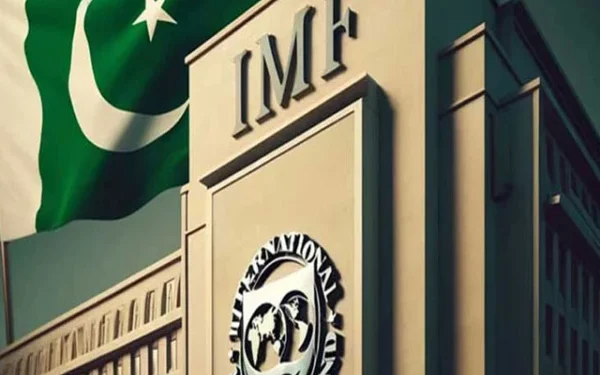Islamabad, Pakistan — As the Pakistani government prepares to unveil the federal budget for the fiscal year 2024–25, it faces serious objections from the International Monetary Fund (IMF) over some of its proposed taxation measures, particularly those targeting movable assets and specific sectors such as poultry farming. The IMF’s reservations highlight the delicate balancing act Pakistan must perform between meeting revenue targets, ensuring social equity, and complying with global financial commitments.
Key Proposals Drawing IMF Scrutiny
Among the most contentious proposals presented by Pakistan’s economic team are:
- The reintroduction of a Capital Value Tax (CVT) on movable assets like cash and gold.
- A 5 percent Federal Excise Duty (FED) on day-old chicks, aimed at expanding the tax base into the agriculture and poultry sectors.
According to sources within the Federal Board of Revenue (FBR) and the Ministry of Finance, the IMF has rejected both these proposals, citing concerns over their potential economic impact and inefficiency in targeting wealth.
IMF’s Position: Tax Income, Not Wealth
The IMF has consistently urged Pakistan to reform its tax structure by prioritizing direct income-based taxation over indirect or wealth-based levies. The global lender believes that imposing taxes on movable assets could:
- Discourage savings and investment.
- Lead to capital flight, particularly of undeclared cash and precious metals.
- Trigger a shift of assets into non-documented sectors.
The IMF reportedly advised the government that taxing actual income is a more efficient and equitable mechanism than wealth taxation, especially in an economy with large informal sectors and limited documentation of assets.
Controversy Around Taxing Day-Old Chicks
The proposed 5 percent excise duty on day-old chicks also drew criticism from the IMF, as well as from local poultry industry stakeholders. This sector is already grappling with:
- Rising input costs, especially feed and energy prices.
- Import restrictions due to foreign exchange constraints.
- Reduced demand from inflation-hit consumers.
Experts argue that taxing a basic agricultural input could further burden small and medium poultry farmers, potentially driving up food prices in the already-inflationary environment.
IMF Approves Tax on Digital Services
Despite opposing several controversial taxes, the IMF endorsed the imposition of a new tax on digital services, which is expected to generate Rs10 billion in additional revenue. This move is in line with international trends where governments seek to:
- Tax multinational tech firms operating within their jurisdictions.
- Ensure fair competition between online and brick-and-mortar businesses.
- Expand their tax base into the digital economy.
The approved tax on digital services is viewed as a progressive step, targeting sectors that have grown rapidly during and after the COVID-19 pandemic.
Changes Proposed in Income Tax Regime
Alongside wealth and sectoral taxes, the upcoming budget is expected to include significant changes to the personal and corporate income tax regime. Key proposals under consideration include:
1. Dividend and Interest Income Tax Increases
- Dividend income from mutual funds: Proposed to rise from 15% to 20%.
- Withholding tax on interest income: Also proposed to increase from 15% to 20%.
These measures aim to boost government revenue by taxing passive income streams, especially for high-net-worth individuals and institutional investors.
2. Exemption Withdrawals
- The FBR is pushing to abolish income tax exemptions for:
- Venture capital companies and funds
- The cinema industry
Removing such exemptions could be a step toward a simplified and broad-based tax system, although it may be met with opposition from industry stakeholders arguing for sector-specific relief.
Tax Relief for Middle-Income Earners
While the top income tax slab of 35% and the 10% income surcharge on monthly incomes exceeding Rs500,000 are likely to remain unchanged, there is some good news for middle-income earners.
The IMF has reportedly agreed to reduce income tax rates for the four lower tax slabs, potentially offering relief to:
- Salaried individuals earning less than Rs500,000 per month
- Small business owners and freelancers operating within the formal economy
This could help ease the tax burden on a large portion of Pakistan’s working population amid record-high inflation and reduced purchasing power.
Disagreements Over Income Tax Exemption Threshold
Another area of contention is the proposal to increase the income tax exemption threshold from Rs600,000 to Rs1.2 million annually. While the Pakistani government had initially floated this idea to offer relief to lower-income groups, the IMF has rejected it, citing concerns over revenue shortfall.
Instead, the IMF has allowed the initial income tax rate to be reduced from 5% to 1%, ensuring that even low-income earners contribute a minimal amount without being fully exempt.
Background: The Capital Value Tax Debate
The idea of taxing movable assets is not new. Under the Finance Act 2022, the government had already introduced a 1% CVT on foreign assets held by Pakistanis, including offshore accounts, properties, and luxury items. However, this tax was immediately challenged in court, with critics arguing it was:
- Poorly designed
- Legally ambiguous
- Potentially unfair to the Pakistani diaspora
The government now seeks to expand this CVT domestically to include cash, gold, and other liquid assets, while exempting stock market investments. However, the IMF remains unconvinced and insists that income-based taxation remains the most transparent and effective approach.
Political and Legislative Context
Prime Minister Shehbaz Sharif has already been briefed on the initial budget proposals. According to sources, there is pressure from various stakeholders, including:
- Provincial governments seeking higher allocations
- Business chambers resisting additional taxes
- Political allies demanding relief measures before local elections
To officially present the budget, President Asif Ali Zardari has summoned the National Assembly session for June 10, where Finance Minister Muhammad Aurangzeb will unveil the fiscal framework for FY2024–25. The Economic Survey of Pakistan—an annual report detailing the country’s economic performance—will be presented on June 9, coinciding with the third day of Eid-ul-Adha.
Conclusion: IMF Pressure Mounts Ahead of Budget Announcement
As the Pakistani government moves closer to presenting its second federal budget under the current administration, it finds itself navigating a complex web of economic imperatives and external conditionalities. With the IMF’s Extended Fund Facility (EFF) program still a crucial source of fiscal support, the government must strike a balance between:
- Satisfying IMF conditions
- Protecting vulnerable segments of society
- Stimulating economic growth
- And ensuring political stability
The IMF’s opposition to certain tax proposals like the CVT on movable assets and taxes on agriculture-related goods underscores the need for careful calibration of fiscal policy. Meanwhile, approved measures like taxing digital services show a path forward that could help broaden Pakistan’s tax net without hurting economic growth.

























